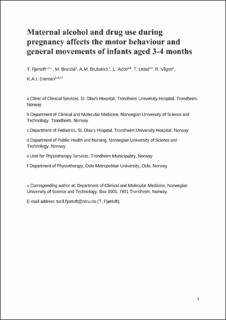Maternal alcohol and drug use during pregnancy affects the motor behaviour and general movements of infants aged 3–4 months
Fjørtoft, Toril Larsson; Brandal, Merethe; Brubakk, Ann-Mari; Adde, Lars; Ustad, T.; Vågen, Randi Tynes; Evensen, Kari Anne Indredavik
Peer reviewed, Journal article
Accepted version
Permanent lenke
https://hdl.handle.net/11250/2985320Utgivelsesdato
2020Metadata
Vis full innførselSamlinger
Sammendrag
Background
Exposure of alcohol and/or other addictive drugs in pregnancy is a documented risk factor for later neurological impairment.
Aims
The aim of the study was to determine whether infants suffering from prenatal exposure to addictive drugs and alcohol develop an abnormal motor behaviour at three to four months of age.
Study design
Controlled cohort study of infants exposed to alcohol and/or other addictive drugs in pregnancy who were recruited from a hospital follow-up programme. The control group consisted of healthy, unexposed infants.
Subjects
The study group of 108 infants exposed to alcohol and/or addictive drugs in pregnancy were enrolled based on referrals from primary health care. The control group included 106 infants who had not been exposed to the aforementioned substances.
Outcome measures
We assessed the general movements (Prechtl’s General-Movement-Assessment, GMA), the motor repertoire (Assessment-of-Motor-Repertoire, AMR), and the Alberta-Infant Motor-Scale (AIMS) in all infants at three to four months of age.
Results
None of the infants in either group had absent fidgety movements (FMs). In the study group 5(5%) had exaggerated FMs and 5(5%) had sporadic FMs; and 68(63%) infants in the study group displayed an abnormal movement character, compared to 23(22%) in the control group (p<0.001). On the AIMS, 46(44%) infants in the study group scored below the 10th percentile, compared to 2(3%) controls (p< 0.001).
Conclusion
The study describes an abnormal movement character of infants exposed to alcohol and/or addictive drugs in pregnancy when their motor repertoire was assessed at three to four months of age. The AIMS also showed negative effects on their motor behaviour.

